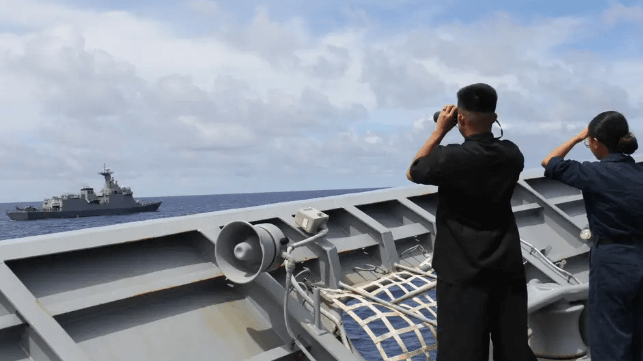Paparo: U.S. Navy is Open to Escorting Philippine Vessels in S. China Sea

Recently-appointed Indo-Pacific Command chief Adm. Sam Paparo visited Manila on Tuesday to show solidarity with the Philippines, one of America's oldest treaty allies in Asia, and he told reporters that his command is open to helping the Philippines conduct navigation in regions where there is routine Chinese interference.
"Certainly, within the context of consultations," said Paparo when asked about whether the U.S. Navy could escort Philippine vessels in the South China Sea. "Every option between the two sovereign nations in terms of our mutual defense, escort of one vessel to the other, is an entirely reasonable option within our Mutual Defense Treaty, among this close alliance between the two of us."
China routinely harasses the Philippine Coast Guard and Filipino fishermen at three locations in the Spratly Islands, all within the 200-mile boundary of the Philippine exclusive economic zone. In recent run-ins, the China Coast Guard has rammed Philippine military vessels; used water cannons on Philippine supply boats; threatened personnel with knives and axes; and injured multiple Philippine servicemembers performing their official duties. One Philippine soldier lost a thumb in a China Coast Guard ramming incident at Second Thomas Shoal in June.
The Philippines would still prefer to handle ongoing Chinese aggression with domestic resources, Philippine Armed Forces chief Gen. Romeo Brawner Jr. said at the same press conference. "The attitude of the Armed Forces of the Philippines, as dictated by the Philippine laws, is for us to first rely on ourselves," Brawner emphasized, speaking to the AP.
Beijing claims sovereignty over the vast majority of the South China Sea, including other coastal states' exclusive economic zones. Chinese scholars and government personnel claim that the history of past Chinese commerce in the region implies a right to modern-day Chinese control of the waterway. The U.S. government and the region's coastal states have rejected this argument, as has the Permanent Court of Arbitration in the Hague.
"The People's Republic of China claims an absurd footprint of sea space that defies logic that impinges not just on the Republic of the Philippines, but of every state within the South China Sea," Adm. Paparo said at an earlier conference in Hawaii this month.

that matters most
Get the latest maritime news delivered to your inbox daily.
Few if any nations openly support China's sweeping claims, but many have remained silent. The 10-member Association of Southeast Asian Nations (ASEAN) has not taken a position, nor has it condemned the China Coast Guard's increasingly aggressive interventions within the Philippine EEZ. At the conference Tuesday, the Philippines' top defense official said that this lack of clarity was undermining ASEAN's authority.
"ASEAN, to remain relevant and credible, cannot continue to ignore what China is doing in the South China Sea," Philippine Defense Secretary Gilberto Teodoro Jr. said.
